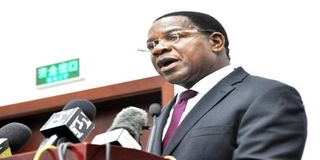Govt to evacuate Tanzanians from South Africa

Foreign Affairs and International Cooperation minister Bernard Membe
What you need to know:
Foreign Affairs and International Cooperation minister Bernard Membe told a news conference that the government was waiting for clearance by South Africa to evacuate 21 Tanzanians currently living in a camp in Durban after fleeing their homes.
Dar es Salaam. Tanzania is ready to evacuate its citizens from South Africa in the wake of xenophobic attacks by locals, the government said yesterday.
Foreign Affairs and International Cooperation minister Bernard Membe told a news conference that the government was waiting for clearance by South Africa to evacuate 21 Tanzanians currently living in a camp in Durban after fleeing their homes.
They are among 23 Tanzanians being sheltered at the camp. Two have said they won’t leave South Africa, he added.
Mr Membe denied reports that Tanzanians are among foreigners killed in the wave of xenophobic attacks, which began about three weeks ago.
He said the three Tanzanians who died in South Africa recently had nothing to do with the attacks.
While Mr Rashid Jumanne was shot dead in a robbery, Athumani China was stabbed to death in a Johannesburg prison while Mr Ali Hashim died of tuberculosis. Hashim’s body was flown back to Tanzania over the weekend.
“I wish to categorically state that no Tanzanian has been killed in the attacks,” he said in the presence of Tanzania’s High Commissioner to South Africa, Ms Radhia Msuya and senior ministry officials.
Mr Membe said it was time African countries ensured that their economies provided more opportunities for their own citizens.
He said a situation where locals felt marginalised was fertile ground for violence directed at perceived beneficiaries.
The minister said, however, that Tanzanians had largely been spared in the attacks in South Africa.
“This wave of xenophobia is selective. Not all people are subjected to the violence. When they ask you where you are from and you tell them that you are Tanzanian, they do not touch you.”
Mr Membe added that Tanzania had a good reputation in South Africa, thanks tothe key role they played in the fight against apartheid.
He urged Tanzanians in the diaspora to report to respective embassies in case they needed assistance.
Mr Membe said Tanzania supports the statement by the African Union chairperman, President Robert Mugabe of Zimbabwe, on xenophobia in South Africa.
Tales from Tanzanians caught up in the xenophobic violence in South Africa denotes shocking experience from those who fled blood-thirsty mobs hell bent on attacking foreigners.
The Tanzanians, who spoke with The Citizen last week from makeshift camps put up to shelter foreigners fleeing from the violence, sent a distress call to the government to evacuate them.
Ms Nuru Abdallah, who is eight months pregnant, said: “We are appealing to our government to urgently take us away from here for our safety is not guaranteed.”
Speaking on the phone from Johannesburg, the mother of two said her family had sought refuge at Isipingo Beach Village in Durban. “I have found nearly 40 other Tanzanians in this temporary camp, but the situation is dire as we are sleeping in the cold and without food,” she said.
Ms Abdallah told The Citizen that she is married to a Mozambican who also fled and has reportedly been sent back to his home country.
Locals and African immigrants in South Africa often compete for scarce jobs, making the foreigners a target for violence and intimidation. Early this year, foreign shopkeepers in and around Soweto fled their premises after violence and looting broke out.
In 2008, 62 people were killed in similar violence in Johannesburg townships. South Africa stands accused of betraying its human rights ideals and African nations that aided in the fight against apartheid.
The violence is embarrassing for the ruling African National Congress, whose members sought refuge in countries on the continent before white-minority rule ended in 1994.




